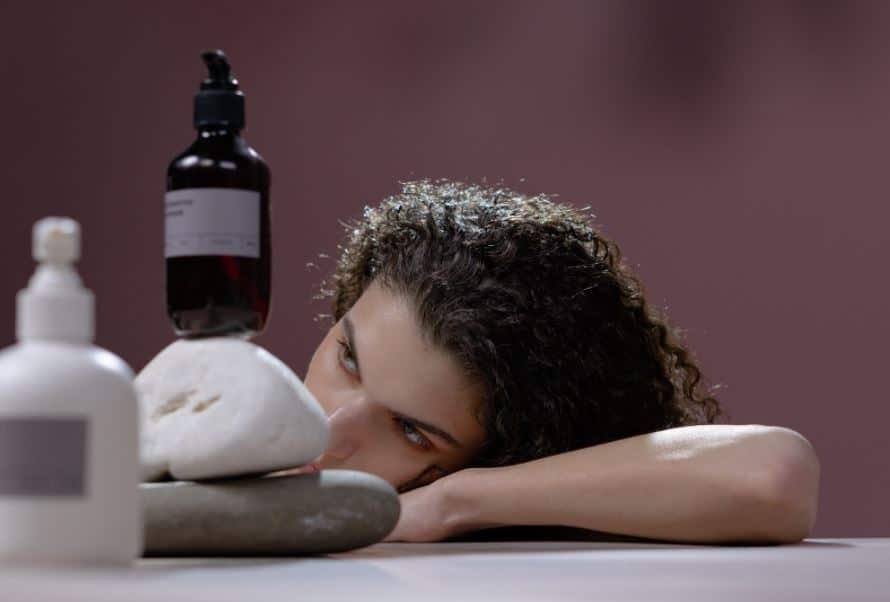Beauty
Why Choose Salt-free Shampoos and Conditioners?

Gorgeous, glossy hair that holds its shine and is easy to work with? It’s what we all long for! However, even when we use salon-grade products, it’s not always easy to find a shampoo and conditioner that works well with your hair. You might end up feeling like you’ve tried everything, and yet your hair still feels dry, brittle, or prone to breakage.
One reason for this could be the prevalence of sulfates in many commonly used hair products. Sulfates or salt compounds, usually sodium lauryl sulfate or sodium Laureth sulfate, are present in a wide range of shampoos and conditioners. These ingredients make for excellent cleaning agents and can help give your hair a soft, smooth feel.
However, for some people with naturally dry hair, shampoo containing salt or sulfates is just too harsh and can make dryness worse. If you’ve noticed your hair becoming brittle or difficult to work with, it might be a good idea to switch to a salt-free shampoo. Fortunately, there are plenty of salt-free shampoo brands that could revolutionize your hair care routine and give you the silky locks you’ve always dreamt of!
[lwptoc]
Why Is Salt Used in Shampoos and Conditioners?
It may seem surprising to learn that salt is a common ingredient in shampoo. After all, if you’ve ever felt that dry, crusty feeling that saltwater can leave in your hair, you may have some questions. However, for many people, using shampoo with salt is just fine and won’t cause any harmful effects.
In fact, salt is present in a host of common cosmetic products. The sulfates in shampoos and conditioners help the products to stick to the hair and to remove dirt and grease when you rinse. This is what helps give you that clean, grime-feeling after washing your hair. Effective alternatives in sulfate-free shampoos and salt-free conditioners are widely available, however, and are just as good at cleaning your hair. If you want to swap to salt-free shampoo and want to know what ingredients to avoid in shampoos and conditioners, look out for sodium chloride on labels. This is how sulfate compounds are usually listed on cosmetic products.
How Salt-Free Shampoo Works

So, what does salt-free shampoo mean, and how does a salt-free shampoo work? How is salt replaced as a cleaning agent in shampoos and conditioners? Well, it turns out that there are plenty of natural alternatives to sulfates that can help you achieve a beautiful, smooth look for your hair.
If you’re looking for a salt-free organic shampoo, many salt-free alternatives replace sulfates with substances such as argan and coconut oil. These agents also cling to the hair and remove dirt, making them just as powerful when it comes to cleaning your tresses. Natural shampoos are also less likely to cause scalp irritation and dry out the hair. Here are some of the other salt-free shampoo benefits that you might notice if you make the switch.
Benefits of Switching to Salt-Free Shampoo
-
Softer, Shinier Hair
Dry hair can develop a drab, lifeless look. It generally doesn’t have much shine and fails to hold that effortless-looking volume we all crave. Instead, dry hair tends to look frizzy and brittle rather than full and rich. Dryness also affects the feel of your hair and can make it feel rough to the touch. To minimize this, a salt-free shampoo can help you achieve a softer, shinier feel in just a few washes. By removing the dryness added to the hair by sulfates, you can reduce hair damage and create a more striking, healthy look. Who could say no to that?
-
Less Frizz
Some people’s skin produces less oil than others and this can lead hair to become naturally dry. When hair is dry, it may look permanently frizzy or may become frizzy quickly in reaction to certain climates, temperatures, or conditions. Frizzy hair can be difficult to style and manage and can lack shine and luster.
If you find that you struggle with frizzy hair, switching to a salt-free shampoo and conditioner could be a good option for you. Sulfates in hair products can increase dryness, which in turn can amplify frizz. To transform your frizzy hair into sleek volume, experiment with some shampoos that don’t contain salt.
-
Better Interactions with Hair Treatment
Salt-free shampoo can interact better with hair that has undergone specific treatment and that requires more delicate handling. For example, salt-free shampoo after keratin treatment can help hair maintain its shiny, smooth results for longer. For best results, look for brands of sodium chloride free shampoo that are specifically designed to mix with keratin treatment results.
Shampoo brands such as NKY1, Damila, and Bellisso offer great sulfate-free shampoos that are specially designed to interact with keratin-treated hair. Using salt substitutes, such as argan oil, allows these shampoos to clean treated hair while protecting its glossy surface glow. This will help extend the lifespan of your keratin treatment and help make trips to your hair stylish less frequent.
-
Reduces Scalp Dryness
Although sulfates are safe compounds to use on hair, for some people with sensitive skin, salt-based shampoos have an irritant effect. If you notice signs of skin flaking, scalp itching after you wash your hair, or redness and rashes on your scalp, it could be the result of your shampoo. Salt draws moisture from the hair and skin so, just as it can increase the dryness of your hair, it can also make your skin dry.
This is problematic if you’re someone who already suffers from dry skin in other areas of the body. If you’re prone to dry skin, switching to a sulfate-free shampoo can help reduce the risk of scalp dryness. This can also help alleviate common accompanying problems, such as dandruff or flaking.
-
Minimizes Breakage
Dry hair tends to be more prone to breakage and split ends. This can increase frizz and can make hair look rough and damaged, rather than smooth and sleek – which is what we all want, right? As salt compounds are often hard on the hair, salt-based shampoos can strip hair of moisture, making breakage more noticeable and severe.
Split ends are also a form of hair breakage that can really take the edge of hair cuts and styles. If you have layered or short hair, split ends can ruin the shape, while for longer styles, split ends can make the line of your hair look messy and unkempt. Split ends and breakage are also a sign that hair is unhealthy. If you find that you regularly have problems with breakage, switching to a sulfate-free shampoo or a salt-free dry shampoo can help you achieve luscious-looking, healthy hair.
-
Easy on the Eyes
If you’re someone who has very sensitive eyes, or if you’re looking for a shampoo for older kids’ hair, then a salt-free alternative might be good for you. Salt in shampoos can make them sting if they get into your eyes while washing your hair. This can be upsetting for children and can be very painful for people whose eyes are particularly sensitive. For a great, gentle alternative option, you could try Nature Nut Dry & Damaged Hair Repair as this shampoo is hypoallergenic and works well on sensitive skin. Perfect for a more relaxing bath time!
-
Works Well with Dyed Hair
When hair is dyed or bleached, it becomes even more important to maintain moisture in order to keep your color and to protect from damage. Wondering what are the best natural shampoos and conditioners for dyed hair? Salt-free alternatives are high on the list.
If you’re looking for a sulfate-free shampoo for colored hair, there are some fantastic options on the market. Look out for products containing natural oils, like argan or macadamia oils, as these will give you the best results. This is especially important if you dye your hair frequently. Adding color to your hair can be harsh on it and can exacerbate problems like dryness, breakage, lifeless qualities, and frizz. Therefore, it’s doubly important if you have colored hair to find a shampoo that works for you and that minimizes these effects.
Conclusion
So, what is the takeaway here? Why use salt-free shampoo? Basically, it’s perfectly safe to use salt-based shampoos on your hair. However, for certain hair types – or for hair that has undergone certain treatments – it may not be ideal.
If you’re thinking about changing to salt-free shampoos and are wondering what shampoos are salt-free, remember to always check the labels. Anything containing sulfates or sodium chloride basically has salt in it. Remember, it’s always good to be aware of what’s in products that you use on the regular so checking labels is a good habit to be in. Once you find the perfect brand of salt-free shampoo for you, you can get ready to enjoy beautiful, salon-fresh hair every day!
Have you experimented with salt-free shampoo? What were your results? What is your favorite go-to brand? Let us know in the comments!
Related Post: Laser Hair Removal Treatment, Is it Worth It?
-

 Celebrity4 weeks ago
Celebrity4 weeks agoIs YNW Melly Out Of Jail? What Is The YNW Melly Release Date, Career, Early Life, And More
-

 Sports4 weeks ago
Sports4 weeks agoMore Than Just a Game: How College Sports Can Shape Your Future
-

 Tech3 weeks ago
Tech3 weeks agoAI Software: Transforming the Future of Technology
-

 Tech3 weeks ago
Tech3 weeks agoAll About Com. Dti. Folder Launcher: Features, Benefits, Tips, And More













